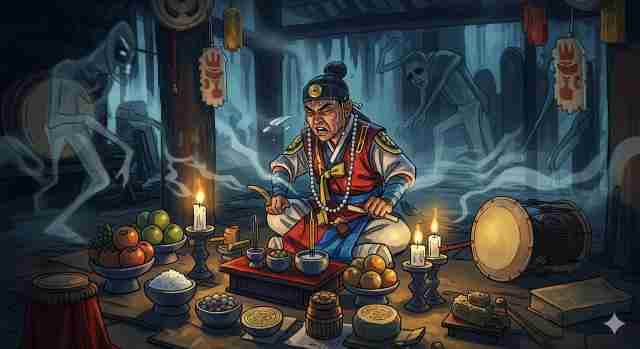Exhuma: The Korean Occult Thriller Captivating Global Audiences
The Rise of “Exhuma” — A New Benchmark for Korean Horror
“Exhuma” stands at the forefront of a new wave of Korean supernatural thrillers, rapidly becoming a cultural phenomenon both in Korea and among international audiences. Its explosive box office debut and the fervor it has generated across social media platforms highlight a film that not only entertains but also resonates deeply with viewers seeking atmospheric, culturally rich horror experiences.
Table of Contents
- Unveiling the Story: Ancestral Curses and Shamanic Rituals
- Cultural Depth: Korean Shamanism, Geomancy, and Folklore
- A Global Conversation: Box Office Triumph and Social Media Buzz
- Narrative Complexity: Layers of Mystery and Metaphysical Threat
- Critical Acclaim: Atmosphere, Performance, and Genre Innovation
- Broader Impact: Shaping the Future of Korean Genre Cinema
- Actionable Takeaways for Viewers and Filmmakers
- Final Thoughts: Why “Exhuma” Matters
Unveiling the Story: Ancestral Curses and Shamanic Rituals
At the heart of “Exhuma” lies a story steeped in Korean spiritual tradition and familial anxiety. The narrative follows two young shamans, Hwa-rim and Bong-gil, summoned by a wealthy Korean family in Los Angeles who are tormented by inexplicable paranormal events affecting their newborn child. The shamans, sensing a malignant ancestral force, enlist a renowned geomancer and a mortician to exhume the grave of the family’s ancestor in a remote Korean village.
This act of exhumation, intended to lift a generational curse, unleashes a malevolent spirit. The film’s plot thickens as the group confronts not only the vengeful entity but also the consequences of disturbing deeply rooted spiritual taboos and historical wounds.
Cultural Depth: Korean Shamanism, Geomancy, and Folklore
“Exhuma” distinguishes itself through its fusion of occult horror with Korean folk traditions. The film intricately weaves elements of geomancy (pungsu-jiri), shamanic rituals, and ancestral reverence into its supernatural narrative. This approach offers a fresh perspective within the horror genre, moving beyond jump scares to explore the psychological and cultural dimensions of fear.
The detailed depiction of Korean funeral rites and spiritual customs has sparked widespread fascination, especially among non-Korean viewers. Online communities and film forums have seen a surge in educational discussions about these traditions, reflecting a growing curiosity and respect for Korean cultural heritage.
A Global Conversation: Box Office Triumph and Social Media Buzz
“Exhuma” opened at #1 in the Korean box office, surpassing one million admissions in its first week—a remarkable achievement for a non-franchise film in the post-pandemic era. This commercial success is mirrored by a robust international response, as English-subtitled trailers and fan reactions trend under hashtags like #KoreanHorror and #ExhumaMovie. Thousands of user reviews and critical discussions have propelled the film into the spotlight, making it a top recommendation for horror enthusiasts and cultural explorers alike.
Influencers, critics, and film podcasters have amplified the buzz, with many calling “Exhuma” a must-see for anyone interested in the intersection of horror and cultural storytelling. Anticipation for wider streaming and festival releases continues to grow, driven by word-of-mouth and online engagement.
Narrative Complexity: Layers of Mystery and Metaphysical Threat
The film’s narrative is layered and intense, involving not just one, but multiple supernatural threats. After the initial exhumation, a series of ominous events unfold—a human-headed snake is accidentally beheaded, triggering a cascade of bad omens and unleashing further evil. The group discovers a second, hidden grave containing a seven-foot-tall coffin, leading to confrontations with vengeful spirits and grotesque apparitions.
These plot developments are not simply for shock value. They reflect deeper anxieties about improper burials, historical guilt, and the consequences of disturbing the past. The film’s antagonist, a grandfather who collaborated with Imperial Japan, embodies these unresolved traumas, making “Exhuma” both a chilling horror story and a meditation on history and memory.
Critical Acclaim: Atmosphere, Performance, and Genre Innovation
Critics and audiences alike praise “Exhuma” for its intense atmosphere, strong performances, and narrative ambition. The film’s visual style—marked by eerie landscapes, meticulous ritual scenes, and unsettling supernatural imagery—creates a sense of dread that lingers long after the credits roll.
The ensemble cast, led by Kim Go-eun, Lee Do-hyun, Choi Min-sik, and Yoo Hai-jin, delivers nuanced performances that ground the film’s supernatural elements in emotional reality. Their portrayals bring empathy and depth to characters caught between duty, fear, and compassion.
Broader Impact: Shaping the Future of Korean Genre Cinema
“Exhuma” continues a trend set by films like “The Wailing,” “Svaha: The Sixth Finger,” and “The Medium,” which use folk traditions and metaphysical themes to craft globally appealing horror. By tapping into universal fears through a distinctly Korean lens, “Exhuma” has helped redefine what international audiences expect from the genre.
The film’s success signals a growing appetite for horror that is both culturally specific and emotionally resonant. Its blend of shamanic folklore, historical reflection, and psychological tension offers a blueprint for future works seeking to balance local authenticity with global appeal.
Actionable Takeaways for Viewers and Filmmakers
- For audiences: “Exhuma” is more than a horror film—it’s an invitation to experience Korean culture’s spiritual and historical dimensions. Watching with an open mind can deepen appreciation for the rituals and beliefs that shape the story.
- For content creators: The film’s success highlights the power of integrating authentic cultural elements into genre storytelling. Thoughtful research and respectful representation can create works that resonate across borders.
- For the industry: The international buzz around “Exhuma” demonstrates the value of accessible subtitles, targeted marketing to global horror communities, and engagement with online discussions to build anticipation and word-of-mouth.
Final Thoughts: Why “Exhuma” Matters
“Exhuma” stands as a testament to the enduring power of culturally rooted storytelling. Its ability to evoke empathy, curiosity, and fear—while introducing audiences to the intricacies of Korean shamanism and the weight of ancestral legacy—marks it as a standout in modern horror cinema.
As global viewers continue to seek fresh and meaningful narratives, “Exhuma” answers the call with a story that is as haunting as it is human, reminding us that the most terrifying ghosts are often those we carry within our collective memory.
For more insights into Korean cinema and its global impact, visit Darakroom for the latest trends and reviews.


